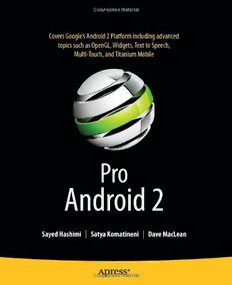
Pro Android 2 PDF
737 Pages·2010·10.81 MB·English
Most books are stored in the elastic cloud where traffic is expensive. For this reason, we have a limit on daily download.
Preview Pro Android 2
Description:
Pro Android 2 shows you how to build real-world and fun mobile applications using Google’s latest Android SDK. This new edition is fully updated for Android 2, covering everything from the fundamentals of building applications for embedded devices to advanced concepts such as custom 3D components, OpenGL, and touchscreens including gestures. While other Android development guides simply discuss topics, Pro Android 2 offers the combination of expert insight and real sample applications that work. Discover the design and architecture of the Android SDK through practical examples, and how to build mobile applications using the Android SDK. Explore and use the Android APIs, including those for media and Wi-Fi. Learn about Android 2’s integrated local and web search, handwriting gesture UI, Google Translate, and text-to-speech features. Pro Android 2 dives deep, providing you with all the knowledge and techniques you need to build mobile applications ranging from games to Google apps, including add-ons to Google Docs. You’ll be able to extend and run the new Google Chrome APIs on the G1, the G2, and other next-generation Google phones and Android-enabled devices. What you’ll learn How to use Android to build Java-based mobile applications for Google phones with a touch screen or keyboard (thanks to Cupcake’s inclusion as of Android 1.5) How to design and architect using Google’s latest Android SDK How to use the Android SDK to write mobile applications for embedded devices How to create 3D graphics with OpenGL and custom components How to build multimedia and game apps using Android’s Media APIs and OpenGL How to use Android’s location-based services, networking (Wi-Fi APIs), and security How to create and allow for more integrated local and web searches How to build handwriting gesture UIs How to incorporate Google Translate into your Android applications Who is this book for? This book is for professional software engineers/programmers looking to move their ideas and applications into the mobile space with Android. It assumes that readers have a passable understanding of Java, including being able to write classes and handle basic inheritance structures. This book also targets hobbyists. Table of Contents Chapter 1: Introducing the Android Computing Platform…1 Chapter 2: Getting Your Feet Wet…25 Chapter 3: Using Resources, Content Providers, and Intents…57 Chapter 4: Building User Interfaces and Using Controls…123 Chapter 5: Working with Menus and Dialogs…171 Chapter 6: Unveiling 2D Animation…217 Chapter 7: Exploring Security and Location-Based Services…243 Chapter 8: Building and Consuming Services…289 Chapter 9: Using the Media Framework and Telephony APIs…327 Chapter 10: Programming 3D Graphics with OpenGL…363 Chapter 11: Managing and Organizing Preferences…421 Chapter 12: Exploring Live Folders…439 Chapter 13: Home Screen Widgets…457 Chapter 14: Android Search…491 Chapter 15: Exploring Text to Speech and Translate APIs…563 Chapter 16: Touchscreens…591 Chapter 17: Titanium Mobile: A WebKit-Based Approach to Android Development…627 Chapter 18: Working with Android Market…661 Chapter 19: Outlook and Resources…675 Check out the authors’ website, www.androidbook.com, for the latest updates and information.
See more
The list of books you might like
Most books are stored in the elastic cloud where traffic is expensive. For this reason, we have a limit on daily download.
